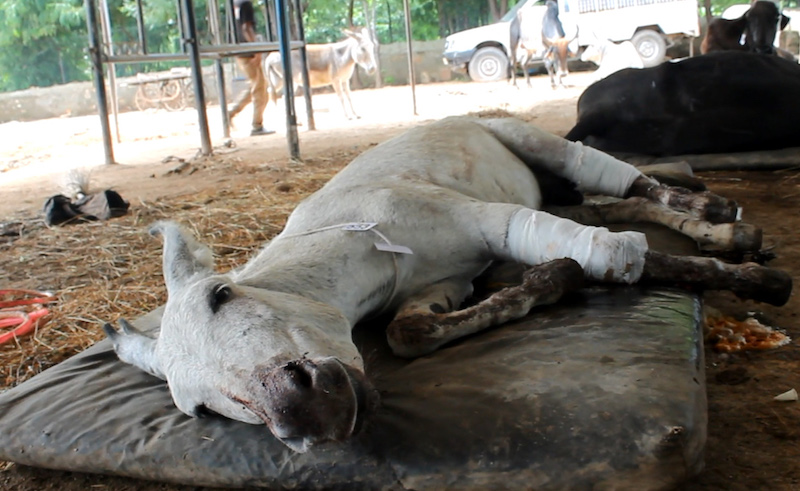Animal Euthanasia in Egypt: Merciful Option or Murder?
Is euthanising an animal in excrutiating pain and with no hope for survival a merciful decision or a cruel one? Staff Writer, Dina Khadr speaks to animal activists, vets and sheikhs to find out where euthanasia is placed on that spectrum.

Religion preaches mercy towards all living creatures. When it comes to mercy killing, however, there have been debates on its lawfulness that sees professionals in several fields constantly in disagreement; with several islamic scholars and sheikhs having likened it to suicide, and therefore deeming it forbidden in Islam. Similarly, animal rights activists have been divided, with some regarding it is a form of murder and others arguing that it is actually an act of mercy depending on the situation; with the alternative being the more cruel solution.
Mercy is defined as the compassionate treatment of those in distress. Extending a helping hand to a powerless animal in dire circumstances is merciful. Feeding a starving street cat is merciful. Saving a donkey from being beaten by its owners is merciful. In all these scenarios, a living being is put out of their misery or at the very least having it alleviated to a degree. But what of the animal with a fatal disease who is in excruciating pain, or the one who is completely crippled which comes with its own set of agonizing health complications. Is putting them out of their pain then by euthanasia an act of kindness and mercy or is it murder?
From a religious perspective, killing is considered one of the gravest sins that all religions seem to agree upon. Sheikh Ibrahim Mohammed strongly refutes the involvement of any human being in deciding the fate of another living creature.
"In religion, the killing of any living creature is strictly forbidden except in certain cases when the animal is considered a danger hazard. However, to kill any animal in order to put it out of its misery is unacceptable. This is no one's decision to make but God's. If he's kept him alive then it is his prerogative. The value of a soul is placed very highly where religion is concerned."
I’m not okay with standing by powerlessly watching him as he suffers and eventually dies.
Euthanasia, however exists in a grey area as it is a topic that is broached from several perspectives with some doctors viewing it as a decision to be taken from a purely medical standpoint, outside of religion. Dr. Ali*, a vet from one of Egypt's prominent veterinary centers weighs in, asserting that religion plays a minimal role in his decision to euthanise an animal.
“Religion touches more on moralities and the proper treatment of animals. Euthanasia is to be applied from a medical perspective. It’s a soul that is in a situation where you need to decide medically what is the correct course of action,” he says. “I personally always try to exhaust all the possibilities in front of me with any case I get before even considering resorting to it.”
I personally wouldn’t do it but it’s a tough decision to take when the animal is paralysed and has no caretakers.
Dr. Ali* defines euthanasia as ending an animal’s life when they’ve already begun to enter the sequence of death or have an incurable disease that will eventually lead to their end.
“We give them an injection to make the process faster; that is when the animal is in a fatal condition and in extreme pain. So for example, some diseases or accidents lead to the complete damage of the nervous system which means that the animal can’t eat, can’t drink, and can’t move,” explains Dr. Ali. “Basically, he has absolutely no reflexes. In these situations where he’s considered dead but still breathing, we’d consider euthanising the animal to put him out of his misery.”
Egypt’s streets are rampant with unsheltered animals that end up either beaten or run over by cars and left to die. Similarly with farm animals, horses and donkeys are constantly being mistreated by their owners and left in dumpsters when they're no longer of use to their human companions.

“I personally wouldn’t do it but it’s a tough decision to take when the animal is paralysed and has no caretakers. With paralysed dogs, there’s a lot of friction with the floor and the animal ends up contracting viruses, bacteria and infections which ultimately will lead to his death or leaves him with unbearable pain. If it isn’t handled properly, a paralyzed dog can develop gangrene too,” says Dr. Ali.
With the animal welfare movement in Egypt having garnered more mercenaries in their battle over the past few years, the question of euthanasia is one that has sparked controversy within the circle. It’s a sensitive topic that seems to defy the logic of a black or white decision process for many. The majority of animal rights activists are, however, strongly opposed to it and those who dare consider it end up somewhat shunned by their community. Animal rescuer and Baladi pet supplies co-owner and co-founder, Eslam Yehia, is on the fence where euthanasia is concerned. While he’s never been put in a situation where he’s had to resort to mercy killing, he can understand those who do, depending on the case.
I’m not for it, nor am I against it.
“Most of the activist community is strongly against it. It’s a fairly new field for us in Egypt so we still don’t have all the answers. We’re still taking baby steps where animal welfare is concerned. Outside of religion, sometimes the more merciful option is actually euthanasia. I’m not for it, nor am I against it. I’ve personally never done it and I hope to never get put in that situation because I’m not sure what I’d do. If he’s paralysed and on the streets, he’ll die anyway and the lead up to death will be far from painless. That for me, is killing him slowly and agonisingly," elaborates the activist. "And if I can’t place him in a home or take care of him, I’m not okay with standing by powerlessly watching him as he suffers and eventually dies. However, so far I’ve been lucky enough to find all the animals I’ve rescued a home. As human beings, we’re supposed to be their protectors so I understand the option where some people put the animal down when they can’t alleviate their suffering and death is inevitable,” concludes Yehia.
Animal rights advocate and activist Nancy* is fiercely opposed to it except in certain situations. She believes that “if it’s in the late stages of death, recommended by the vet and the animal is in extreme pain, I would do it. However, some activists would rather kill them mercifully if they know they’re going to be poisoned or die anyway. While I do understand that point of view, I don’t support it nor would I personally ever consider doing it.”
With the shelters being overpopulated in Egypt and the ratio of animal rescue centers to actual animals being widely disproportionate, stray animals don’t always get the medical attention they need due to a lack of resources. Moreover, the living conditions they end up in - while the lesser of two evils - remain unhealthy when it comes to certain cases. Some activists suggest euthanasia when the proper environment cannot be provided and will only add to the animal’s pain.
Are you keeping him living in this state to show that you're merciful or to appease your conscience? This is not mercy.
Amina Abaza - founder of the Society for the Protection of Animal Rights in Egypt (SPARE) and Egyptian Ambassador for World Animal Day - has previously been attacked by the animal welfare community for her views on euthanasia. Being one of the oldest activists in the animal welfare scene, Abaza wasn't always pro-euthanasia. Experience though, taught her to look at it under different light.
“When I was younger - much like a lot of the activists today - I was appalled at the thought of euthanasia but as I got older, I realised it's the more merciful decision to take in some cases. A lot of the stray animals are poisoned on the streets. Do you know what it’s like to get poisoned or to see an animal that is poisoned? The animal starts convulsing and it’s an extremely agonising death," explains Abaza. "So animal welfare organizations started doing the Trap, Neuture, and Return (TNR) method which is in and of itself traumatising because the animal is basically getting snatched off his territory all of a sudden. When the neutered animals were released back on the streets, they were killed anyway. So what is the realistic solution in that case?"
Deeming conditions in shelters to be unhygienic and more harmful to the paralysed animal - who is forced to slither on dirty floors - Abaza finds mercy killing to be a better option if the correct environment can't be provided.
It's one of the toughest decisions I've ever had to make.
"I had a rescue paralysed dog in my shelter and he ended up with terrible infections and health problems. I thought I was saving him and doing the right thing until one of the representatives from an international animal welfare organisation came and visited. He said to me 'You call this animal welfare? This dog is suffering. Are you keeping him living in this state to show that you're merciful or to appease your conscience? This is not mercy.' And he was right," says Abaza. "If we cannot give a sick animal the environment they require, then what are we doing? It's not even considered letting him die comfortably because it's nothing close to comfortable. Shelters are overcrowded with animals and sometimes they attack the weaker ones. It's happened before in my shelter and we didn't have time to save the dog. In the case where we can take responsibility and provide a disabled animal the needed environment, euthanasia is completely out of the question."

Having used the TNR method on stray animals herself - which is the solution most activists have found to try and prevent animal poisoning - Abaza was put in a situation where she was outright told that they'd kill the animal anyway, neutered or not.
"That's when I stepped in and put the animal to sleep my own way, mercifully. It's one of the toughest decisions I've ever had to make. Before giving the lethal injection, you give the animal a tranquilizer to ensure that he is in a state of complete peace, devoid of any sort of mental agony. That wouldn't have been the case if they had poisoned him."
Main image taken from prishtinainsight.com.
























